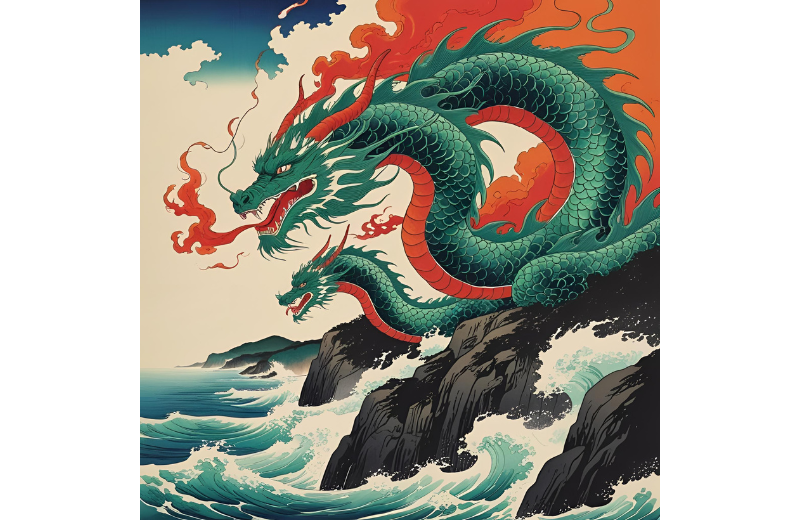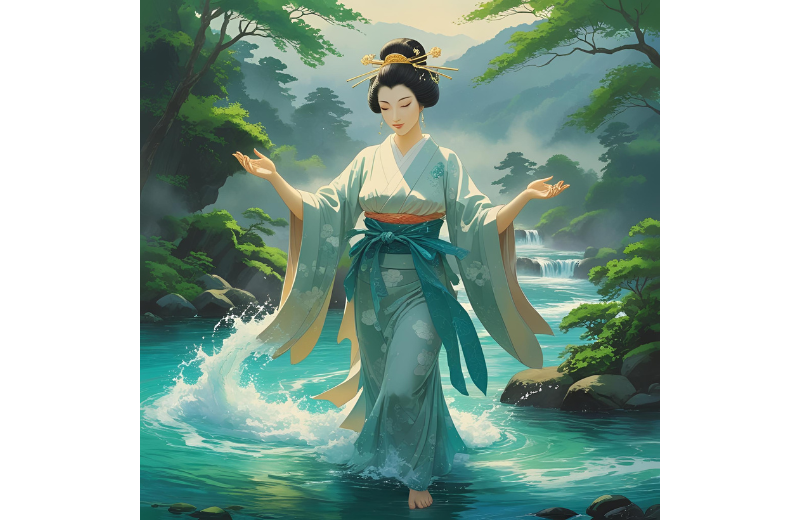If you’ve ever felt drawn to the mysteries of water, music, beauty, or eloquent speech, you might find yourself curious about Benzaiten, one of the most captivating figures in Japanese mythology. People often search for her when exploring Japanese gods and goddesses or when delving into the spiritual world of creativity and fortune. This blog explores her stories, meanings, and enduring influence.
Jump to:
- Who Is Benzaiten in Japanese Mythology?
- Benzaiten’s Myths
- The Role of Benzaiten in Japanese Storytelling
- What Powers Did Benzaiten Possess?
- Symbols Associated with Benzaiten
- Benzaiten's Lineage and Connections
- Why Is Benzaiten Special?
- Benzaiten in Modern Culture
- Benzaiten’s Worship and Legacy
- Frequently Asked Questions About Benzaiten
- Study Japanese Mythology for £29
Recommended for you!
Best SellersWho Is Benzaiten in Japanese Mythology?
Benzaiten, also known as Benten, is a goddess in Japanese mythology with deep connections to water, music, love, and wisdom. She’s one of the Seven Lucky Gods (Shichifukujin), a popular group of deities associated with fortune and good luck in Japan. Her origins trace back to Hindu and Buddhist traditions, where she’s connected to the Indian goddess Sarasvati, a deity of learning, speech, and the arts.
In Japan, Benzaiten evolved into a unique figure who embodies eloquence, music, protection, fertility, and the power to control wealth and the flow of water. The meaning of her name reflects her essence: "Benzaiten" means “goddess of eloquence” or “speech that flows,” much like the waters she governs.
Benzaiten’s Myths

The legends of Benzaiten are rich with symbolism, transformation, and divine beauty. They shape her identity as a goddess and reflect the values and beliefs of the people who worship her:
The Legend of the Five-Headed Dragon
The legend of Benzaiten often refers to her most well-known tale involving a terrifying five-headed dragon. This creature terrorised the coastal region of Kamakura until Benzaiten descended from the heavens to bring peace. Her presence was so radiant and wise that the dragon fell in love with her. She agreed to marry him only if he promised to stop harming people and instead protect them. In response, the dragon transformed into a guardian spirit, choosing harmony over destruction.
The Story of Enoshima
The sacred island of Enoshima, just south of Tokyo, is said to have risen from the sea upon Benzaiten’s arrival. Her appearance marked the end of turmoil and the beginning of peace and prosperity in the region. Today, Enoshima remains one of the most famous places of worship dedicated to her, attracting visitors who seek blessings in love, art, and fortune.
The Role of Benzaiten in Japanese Storytelling
Benzaiten’s influence goes beyond singular myths; she appears throughout Japanese folklore, temple worship, and cultural festivals. Her tales often reflect her ability to balance ferocity with gentleness, action with artistry. She’s a multi-faceted character: divine yet relatable, serene yet powerful. She stands as a symbol of how creativity and intelligence can bring peace and transformation.
Her blend of Buddhist, Shinto, and Hindu roots means she exists at the crossroads of belief systems, which helps explain her flexibility across different types of stories and communities.
What Powers Did Benzaiten Possess?

Benzaiten’s powers are both spiritual and symbolic. Most notably, she governs:
- Water: As a goddess of rivers, lakes, and the sea, she represents flow in both nature and human expression.
- Music and the arts: She grants inspiration and talent to musicians, poets, and artists.
- Wisdom and eloquence: She brings clarity and grace to speech and writing.
- Wealth and fortune: Some traditions say she controls the movement of money like the currents of the ocean.
These attributes make her a favourite for those seeking creativity, prosperity, and clear communication.
Symbols Associated with Benzaiten

The symbols connected to Benzaiten reveal the depth and diversity of her divine role. Each element reflects a part of her character, from her musical grace to her power over nature and fortune. These symbolic features appear frequently in her depictions and at shrines dedicated to her worship.
- The biwa: A traditional Japanese lute, the biwa highlights Benzaiten’s deep association with music, poetry, and cultural refinement. It symbolises inspiration, artistic talent, and eloquence.
- Snakes or dragons: These creatures are linked to her myth involving the dragon of Enoshima, and they reflect her connection to water, transformation, and protective strength.
- White robes: Often shown wearing flowing white garments, Benzaiten embodies purity, wisdom, and spiritual authority.
- Jewels: Frequently depicted with a sacred jewel, she’s believed to hold the power to control tides or grant wishes, aligning her with themes of prosperity and divine generosity.
Benzaiten's Lineage and Connections
Benzaiten is widely worshipped in Japan as a goddess, but her spiritual origins reach much further back. She is also recognised as a bodhisattva, an enlightened being in Buddhist tradition who chooses to remain in the world to help others achieve wisdom and liberation. This connection reflects her compassionate personality and role as a divine guide in both religious and cultural contexts.
Her roots can be traced to Sarasvati, a deity in Indian mythology associated with knowledge, music, and eloquence. As beliefs travelled along the Silk Road through China and into Japan, Sarasvati evolved to suit new cultural landscapes, eventually becoming Benzaiten. Although she retained her strong ties to speech, music, and learning, she also adopted additional qualities, such as links to water, fortune, and protection, that made her more relevant to Japanese society and belief systems.
Why Is Benzaiten Special?

Benzaiten stands out among deities because she bridges many worlds; she’s a figure who connects water and land, art and action, intellect and emotion. Her ability to resonate with such a wide range of people is part of what makes her so beloved. Artists and musicians are drawn to her for inspiration, while others seek her blessings for success, protection, and prosperity.
She’s most commonly depicted as a beautiful female figure dressed in flowing robes, often playing a musical instrument. However, historical texts and traditions occasionally portray her in male or androgynous forms, reflecting her adaptability and spiritual fluidity across different belief systems.
Benzaiten in Modern Culture
Benzaiten hasn’t faded into obscurity; she appears in modern anime, literature, and video games. For example, her influence can be seen in Noragami, where characters inspired by the Seven Lucky Gods echo her grace and divine power.
She continues to be invoked in artistic communities, at musical performances, and by people looking to tap into personal creativity or spiritual strength. Even today, shrines dedicated to her, like the Enoshima Shrine or those in Hiroshima and Kyoto, are places of pilgrimage for both worshippers and curious travellers.
Benzaiten’s Worship and Legacy
Benzaiten’s worship has evolved from high temple rituals to popular street festivals. People visit her shrines to pray for success, wealth, safe journeys, and artistic guidance. Offerings to Benzaiten often include:
- Coins or money (as a nod to her power over fortune)
- Music (live performances or symbolic offerings)
- White flowers or water-based items
- Food, especially rice or sweets, as signs of gratitude
Recommended for you!
Best SellersFrequently Asked Questions About Benzaiten
What does Benzaiten mean in Japanese?
The name Benzaiten means “goddess of eloquent speech” or “speech that flows”, echoing her links to water, communication, and music. This meaning reflects her ability to inspire clarity, beauty, and artistic expression in those who seek her favour.
Is Benzaiten a bodhisattva?
Benzaiten is often regarded as a bodhisattva in Buddhist traditions, especially given her roots in Sarasvati. This association highlights her compassionate nature and commitment to helping others attain enlightenment through knowledge and creativity.
What is Benzaiten’s personality?
Benzaiten is wise, graceful, confident, and inspiring, often seen as both an active protector and a muse. Her energy is calming and commanding, encouraging people to trust their voice and pursue their passions with purpose.
Study Japanese Mythology for £29
Interested in exploring more about ancient Japanese beliefs, traditions, and divine figures like Benzaiten? The Introduction to Japanese History and Culture Diploma Course from Centre of Excellence is the perfect place to start. For a discounted price of £29, you'll learn about he spiritual stories, practices, and philosophies that shaped Japan’s past and continue to influence it today.













